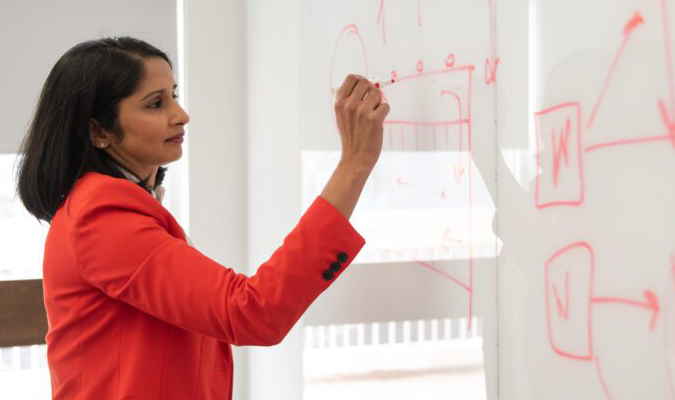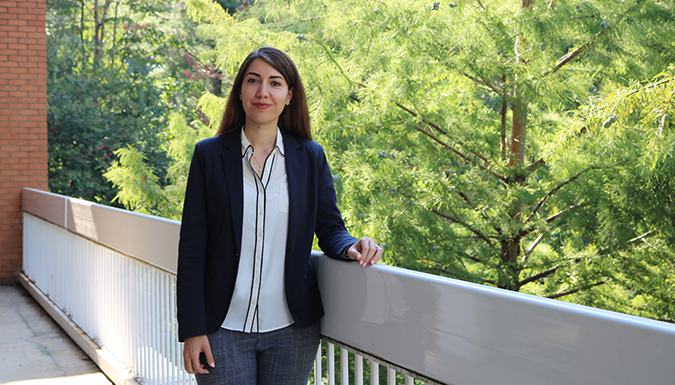Telemedicine Project Team Members

Kapil Chalil Madathil, Ph.D.
Assistant Professor, Departments of Civil and Industrial Engineering, Clemson University
Kapil Chalil Madathil, PhDis an assistant professor in the Departments of Civil and Industrial Engineering. Hisarea of expertise is in applying the knowledge base of human factors engineering to the design and operation of human-computer systems for complex environments that involve rich interactions between people and technology. Dr. Madathil has specific expertise in the areas of human factors and system design and the application of these principles to the healthcare domain.

Anjali Joseph, Ph.D., EDAC
SmartState Endowed Chair in Architecture + Health Design and Research
Anjali Joseph, Ph.D., EDAC is the Spartanburg Regional Health System Endowed Chair in Architecture + Health Design and Director of the Center for Health Facilities Design and Testing at Clemson University. Dr. Anjali Joseph is focused on using simulation and prototyping methods to research and test effectiveness of promising design solutions that may impact patient safety in high stress healthcare environments. She has focused her research on multidisciplinary approaches to improving patient safety in healthcare through the development of tools and built environment solutions. She is also interested in understanding the role of the built environment in improving population health outcomes. She is currently leading a multidisciplinary AHRQ funded project to develop a learning lab focused on improving patient safety in the operating room. She led the research activities at The Center for Health Design before joining Clemson. Here, she served as principal investigator on several grants from different organizations such as Robert Wood Johnson Foundation, the Agency for Healthcare Research and Quality, U.S. Green Building Council and the Kresge Foundation. Anjali’s work has been published in many academic journals and magazines. She frequently peer reviews articles for journals. She currently serves on an independent review panel on military medical construction standards for the Defense Health Agency. Anjali obtained her Ph.D. with a focus on Architecture, Culture and Behavior from the Georgia Institute of Technology, master's degree in Architecture from Kansas State University and bachelor’s degree in Architecture from the School of Planning and Architecture in New Delhi, India.

Nathan McNeese, Ph.D.
Assistant Professor of Human-Centered Computing, School of Computing, Clemson University
Nathan McNeese, Ph.D.is a human-factors engineer and information scientist with over 10 years of basic and applied research in the domains of healthcare, emergency crisis management, military operations, and homeland security. Dr. McNeese’sexpertise is in understanding and applying the concept of team cognition to real world teams, environments, and collaborative technologies. Hiswork has focused on better defining and understanding the study of team cognition and technology,human-machine teaming, and the development/design of human-centered collaborative tools and systems. Specific focuses are on applying principles of team cognition to healthcare-oriented teams and translating principles of human-humanteam cognition to human-machine team cognition. Over the years, Dr. McNeese has been involved in multiple studies exploring thedesign of healthcare IT for the purposes of better teaming. His research methodologies are diverse, spanning both qualitative and quantitative techniques with particular expertise in experimentation, ethnography, and a variety of human-centered computing development and evaluation techniques.

Christine A.Holmstedt
D.O.Medical Director,Clinical Stroke Services, Co-Director,Comprehensive Stroke & Cerebrovascular Center, Medical University of South Carolina
Christine Holmstedt, D.O.isa very active Vascular Neurologist working with the Medical University of South Carolina (MUSC) and involved with arobust 26 site telestroke program. Her interest is acute stroke treatments and performance improvement in acute stroke care delivery. Dr. Holmstedtisalso Principal Investigator for several stroke trials at MUSC.

James T.McElligott, M.D.
Associate Professor, Department of Pediatrics, Medical University of South Carolina
James McElligott, M.D.isthe Medical Director for Telehealth at the Medical University of South Carolina (MUSC)and an Associate Professor in the Division of General Pediatrics at MUSCChildren’s Hospital. He oversees the Center for Telehealth, which has the responsibility of managing over $80 million in South Carolina state appropriated funds for the application of telehealth and has been designated as a National Center of Excellence of Telehealth. Dr. McElligott currently serves as the Chair of the Advisory Council of the South Carolina Telehealth Alliance and as the President of the American Telemedicine Association’s Pediatric Special Interest Group.

Suparna Qanungo,Ph.D.
Assistant Professor,College of Nursing, Medical University of South Carolina
Suparna Qanungo, Ph.D. isactively involved in research collaborations and designing qualitative and mixed method studies within and outside the Collegeof Nursing, in the community and globally. Sheservesas the Director of the Telehealth Research Program at the MUSC Center for Telehealth. Dr. Qanungo’s research has focused on 1) Community-engaged research approaches, developing partnerships, understanding health systems, community building capacity and strategic planning related to chronic disease prevention and management to impact population health;2) Advancing health equity by the elimination of health disparities and serving the underserved communities; and3) Global health research to improve access to care for chronic diseases and cancer in low and middle-resource countries. She currently servesas the Global Coordinator for the MUSC College of Nursing. Dr. Qanungo leadstwo global health pilot research projects, one for improving access to palliative care for cancer patients and the other for understanding the barriers to independence for spinal cord injured people in India. She is also collaborating with multiple investigators on two community-based intervention studies for stroke patients in Ghana and hasrecently visited the country to assist with community assessments for these projects.

Richard J.Holden, Ph.D.
Assistant Professor of BioHealth Informatics, Indiana University School of Informatics and Computing
Richard Holden, Ph.D. is a human factors engineer & psychologist with 16 years of applied research in the domains of health and healthcare. Hisexpertise is in the application of human factors theories, tools, and methods to the user-centered design and evaluation of health information technology (IT). Dr. Holden’swork spans settings such as the emergency room, pediatric and adult hospitals, inpatient pharmacy, hospital IT departments, primary and specialty outpatientcare clinics, and community-based population health management programs. He hasbeen involved in numerous health IT design and evaluation projects spanning a wide range of technologies used by clinicians and patients. Dr. Holden’s particular expertiseis in the use, adaptation, and development of research tools and methods, particularly for in situmixed methods field research. He has served asPrincipal Investigator or played key roles on 15 projects funded by NIH, the Agency for Healthcare Research and Quality (AHRQ), National Institute of Standards and Technology (NIST), Patient Centered Outcomes Research Institute (PCORI), and other national entities. In the last 10 years, Dr. Holden has authored over 100 articles, refereed proceedings papers, and book chapters on human factors in health and healthcare.

Hunter Rogers
PhD Candidate in Industrial Engineering, Clemson University
Hunter Rogers received her bachelor’s and master’s degree inIndustrial EngineeringatClemson University. Her current research focuses on developing methods to enhance distributed cognition in telemedicine-integrated ambulance-based caregiving environments to improve stroke care. Hunter’swork in teleoperated robotics and UAV decision support displays hasbeen presented atthe Human Factors and Ergonomics Society Annual Meeting and published in peer-reviewed journals. In 2017 Hunterwas selected to be aUnited States DoD SMART Scholar.

Sahar Mihandoust, Ph.D.
Research Assistant Professor in Architecture + Health
Sahar Mihandoust, Ph. D. is a Research Assistant Professor for the Center for Health Facilities Design and Testing at Clemson University. Sahar’s research focuses on the effects of biophilic design on nurse and patient outcomes in Intensive Care Units. In her research she explored and compared the spatial configurations of Intensive care units, nurse’s perception of their environment, and nurse burnout levels. Her research interests also include evidence-based health care design, patient safety, and design for special populations. In her current position she is collaborating in a multidisciplinary team to examine built environment solutions for improving patient safety, user experience and operational efficiencies. Sahar obtained her Ph.D. in Environmental and Interior Design from Texas Tech University; She has also earned a Master’s degree in Architecture from Rensselaer Polytechnic Institute in New York and an M.Arch degree from Iran University of Science and Technology. Sahar has over five years of experience in research, teaching, and practice in interior design, healthcare design, and architecture in the United States and Iran.
